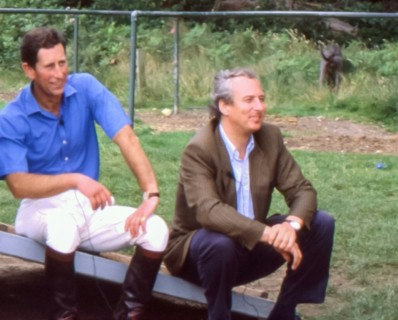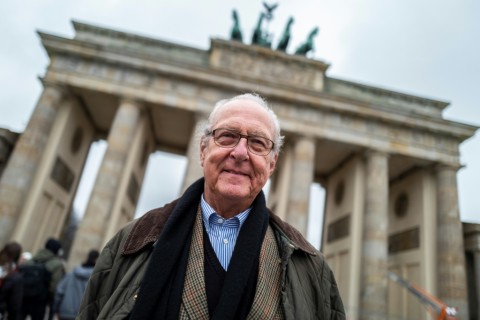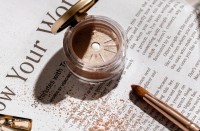by Isabelle LE PAGE
Agence France Presse
Berlin, Germany (AFP)

(AFP)
They first laid eyes on each other as children at Buckingham Palace and later crossed paths on the polo field at Windsor.
Prince Eduard von Anhalt, descendant of an ancient Germanic line, likes to regale listeners with tales of his close hereditary ties with the British royal family and especially King Charles III.
However, the 81-year-old distinguished aristocrat will be just another face in the crowd of journalists covering the event during his illustrious relative’s official visit to Berlin from Wednesday.
“I hope to be able to talk to him briefly at the ceremony in the Bundestag (lower house of parliament),” said the man who made his name in Germany as a society journalist and television commentator on royal events.
“I’m the only relative (of the Windsors) who gets in front of a camera and explains things in detail” about the royal family, he told AFP in the German capital.
This journalistic role, which he took on after his family was dispossessed of its castle and property in the east German state of Saxony-Anhalt under Communism, is “more important” than attending the big festivities.
During the funeral of Queen Elizabeth II last year, to which von Anhalt says he was invited, he chose instead to comment for television.
– Invitations to Windsor –
The link between his lineage — from the ancient House of Ascania, which helped create Berlin — and the British royal family is not exactly direct.
It derives from the marriage of his great uncle Aribert of Anhalt, who died in 1933, to Princess Marie-Louise, a granddaughter of Queen Victoria, herself a great-great-grandmother of Elizabeth II, the prince explained.

It was this great aunt, who died in 1956, who invited his mother and siblings to Windsor outside London, where the imposing British royal residence is located.
“At the time, we children could go to Buckingham Palace but not my mother because she was divorced,” he recalled.
If this rule still applied today, “Buckingham Palace would be virtually empty”, he added with a laugh.
He met Charles, seven years his junior, at one of these occasions, “when we were children”.
After that, “we bumped into each other several times” during his many visits to Germany, often “incognito”, or when both were attending British polo tournaments.
And in the 1990s, Charles agreed to become patron of Woerlitzer Park in Saxony-Anhalt.
Charles visited the park, the largest English garden complex in continental Europe, in 2019, the prince added.
– French rosé –
Von Anhalt also fondly remembers the time spent with Charles’ father, Prince Philip, who came from Danish-German stock.
“He often organised events and was also happy to welcome German relatives,” he said.
“He was very funny. He taught me, for example, to drink French rosé because it is much more digestible than white for older gentlemen,” he recalled.
As for Charles, he praised his relative’s “socially conscious” character and pointed to his long-standing commitment to the underprivileged.
Although Charles was the longest-serving heir to the British throne, he was never “frustrated” by it, von Anhalt said.
“He really enjoyed being the Prince of Wales because he could say whatever he wanted,” Eduard says.
“When he is crowned king, he will only be allowed to say what the government likes.”
By deciding to travel to Germany for his first foreign visit as king — the French leg of the trip has been postponed due to anti-government protests there — he is nevertheless sending a message about the importance of his country’s relationship with Europe.
“Even though the family could never say that Brexit was not a good thing, I know that they did not approve of it,” the prince said.








